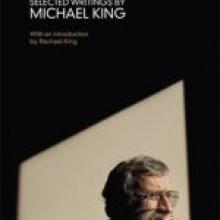
Michael King
Penguin
So it is excellent that his daughter Rachel and son Jonathan have put together this volume of some of his published and unpublished shorter essays and speeches.
There are some gems among the selection, of which I will mark two: the title piece, which is to do with the King family ancestry, and a paper called "Maori and Pakeha", which he delivered to the Auckland Writers and Readers Festival in 2003.
"The Silence Beyond" seems to have been part of a possible new volume of autobiography. It stands well on its own and is a lesson for everyone engaged in a search for family history. Like most of us involved in such adventures King turned up a skeleton or two, a few secrets, at least one mystery (in his case a major one), and made several discoveries of relatives he did not know he had.
As a writer who devoted so much of his career to the search for identity in the context of multi-ethnic New Zealand, even the search for an identity, this essay illustrates his thoroughness as a researcher, his tremendous enthusiasm and his ability to reach a succinct and convincing conclusion.
Here he is speaking of a reticent grandmother, who had finally revealed some family confidences: "It was nobody else's business, she said, but her own; and what was passed was past. It was the present and the future that you had to look to. And it was with that unshakable attitude that she had survived." Those remarks will be familiar to many people of a certain age and generation.
King is poignant, too, when disclosing how the automobile had exacted a terrible toll on the family - seven deaths or permanently injured members, for we know what he could not know when writing the essay.
I chose to refer to "Maori and Pakeha" because of its continuing relevance, for its sub-title - "which people and culture has primacy" - is an issue for which the debate is ceaseless. In light of current Pakeha irritation with Maori settlements and perceived grievances and the like, some of King's remarks have continuing resonance. In asking for a mutuality of respect, he "personally would like to see New Zealand English given the same protection and emphasis as New Zealand Maori.
I want to see wahi tapu of significance to Pakeha, such as Frank Sargeson's grave, given as much protection as wahi tapu of significance to Maori; and I want the history and experience of Pakeha New Zealanders to be valued by the country as a whole, and by its institutions, as much as those of Maori."
These are themes he explored throughout his mature writing career and, to the extent that those who hold power may eventually notice them, will surely eventually form the basis of our survival as a country.
Some of the other contents in this book will revive a memory or two among older readers, including references to Jim Baxter's death and tangi, a look at literary Dunedin, and King's previously published reflections on Sargeson, Davin and Frame.
I hope there is more in the archive to come, but in expressing this wish I expect the publisher to better serve readers than it has with this volume.
There has been reliance on the spell-checker but as we know the spell-checker doesn't think, and some potted biographical reference to King's career and achievements would be valuable for younger readers new to him. Rachel King's introduction is, however, excellent within its limitations.
- Bryan James is the Books Editor.













